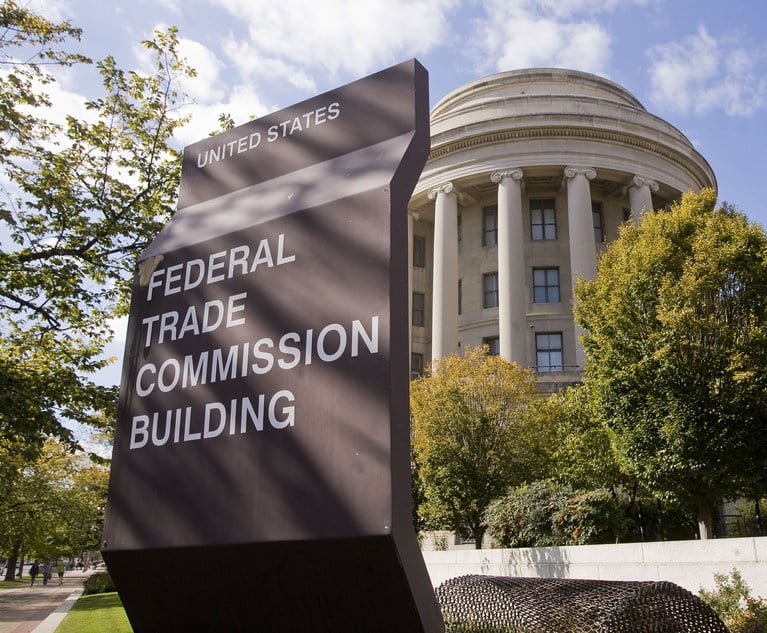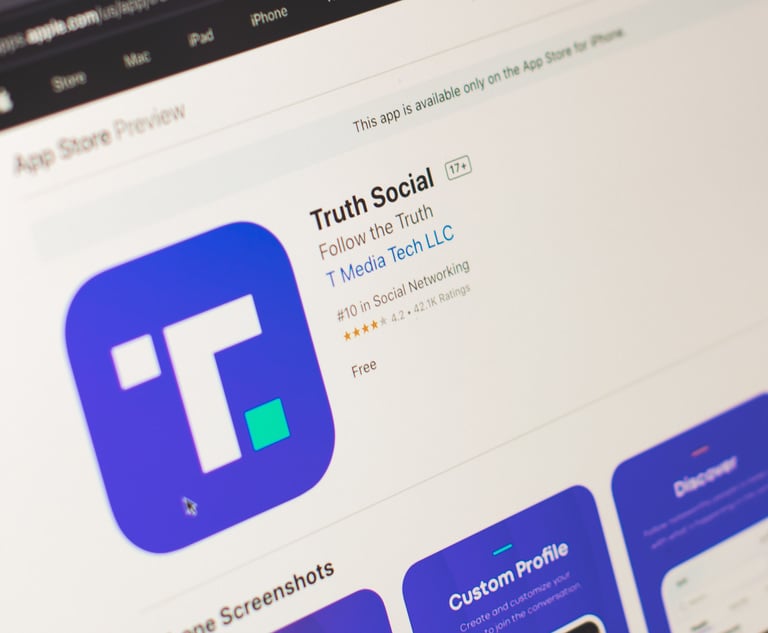5 Things to Know About CFIUS Reviews
In October, insurer GenwoRTH Financial Inc. indicated its plan to be acquired by China Oceanwide Holdings Group Co. Ltd. had hit a snag at the federal…
November 20, 2017 at 03:03 PM
17 minute read

In October, insurer GenwoRTH Financial Inc. indicated its plan to be acquired by China Oceanwide Holdings Group Co. Ltd. had hit a snag at the federal government panel that reviews transactions with foreign companies for national security concerns—the Committee on Foreign Investment in the United States.
The companies gave notice that they were withdrawing their joint voluntary notice and planned to resubmit it later after proposing mitigation measures.
Less than a month before, President Donald Trump, based on a recommendation from the CFIUS, blocked a deal in which Portland-based Lattice Semiconductor would have been acquired by a Chinese-backed company, Canyon Bridge Capital Partners. This marked only the fourth time in more than 25 years a president had taken this action.

CFIUS, headed by the Treasury secretary, currently Steven Mnuchin, is the secretive government group within the U.S. Department of the Treasury that is made up of members of agencies including the U.S. Department of Defense, the Department of Homeland Security and the State and Commerce Departments. Its workings are confidential.
Recently confirmed Assistant Treasury Secretary Heath Tarbert, a soon-to-be former Allen & Overy partner, is set to be responsible for the unit.
“Threat, vulnerability, consequence is the paradigm CFIUS analysis,” said Steven Heifetz, a partner at Steptoe & Johnson in Washington, D.C., explaining the group's decision-making process. “CFIUS looks at who is the foreign acquirer and what is the intent and capability of the acquirer, and what are the assets and how can they be used to the detriment of U.S. national security.”
At a time of rising tensions between Asia and the Trump administration, CFIUS' role is becoming more prominent in cross-border deal-making and transactions are becoming tougher to close, CFIUS experts said.

Now, as tensions with North Korea and its trade partner China escalate, some legislators such as Sen. Chuck Schumer, D-New York, and Sen. John Cornyn, R-Texas, have proposed toughening the U.S. review of certain deals even more.
Anne Salladin, special counsel at Stroock & Stroock & Lavan in Washington and a former senior counsel at the Treasury Department for CFIUS matters, said recently, “with respect to Russian and Chinese transactions there has been heightened scrutiny for some time now, depending on the country of the acquirer and the U.S. businesses that are involved.
Here are five things to know about the committee and how the process of national security review is changing:
1. CFIUS Reviews More Cases
While just 97 transactions were subjected to CFIUS review in 2013, the committee reviewed 173 transactions in 2015, according to the Treasury Department's CFIUS 2016 Annual Report to Congress released Sept. 20. This year, the number is expected to top 200, according to a public statement by a Treasury Department official.
More transactions are filing for review at least in part because there are more deals in general: Chinese companies alone invested a record $45.6 billion in the United States in 2016, a tenfold increase over the last five years, according to New York consulting firm Rhodium Group. Last year, 2,274 cross-border transactions involved U.S. companies according to Mergermarket, an Acuris company.
2. Reviews are Taking Longer
The time it takes for the committee to accept a transaction for review has increased, with pre-review in even straightforward cases taking longer, some specialists said. From the time of sending a draft to acceptance for review is running a month or two on average, up from about two weeks, multiple sources said. Six weeks is not unusual for an initial filing. Even deals originating in European countries, where there were few concerns in the past, are coming under increased scrutiny.
3. More Deals are Being Scuttled or Withdrawn
Most transactions that have come before the panel are approved. But if the committee finds that a deal presents risks, it can suggest mitigation measures, such as dropping part of it. This appears to be happening more often. In addition to the deals blocked or delayed pending mitigation, the CFIUS in July rejected HNA Group affiliate Beijing Shareco Technologies Co. Ltd.'s plan to invest $103 million in Los Angeles-based in-flight entertainment service provider Global Eagle Entertainment Inc., as reported in ALM affiliate, The Asian Lawyer.
The CFIUS, according to news reports, also opposed a bid by China-based Anbang Insurance Group to purchase properties from a subsidiary of Blackstone Group, including the Hotel del Coronado in Coronado, California, because Coronado is home to several military bases. The deal closed in October 2016, but without the $1 billion Coronado property.
4. Deals From Countries Other Than China Also Scrutinized
In December 2016, then-President Barack Obama issued an executive order blocking Grand Chip Investment GmbH of Fujian's proposed $714 million acquisition of semiconductor maker Aixtron SE, as a national security risk. It was the third time that a president blocked a sale. Aixtron, located in California, is the U.S. unit of a company based in Germany.
The CFIUS has been increasingly more concerned about minority stakes, joint ventures and startup investments than in the past, practice experts said, even if the acquiring company or acquisition target is headquartered in a country not normally regarded as high risk.
5. More Industries and Assets Flagged for Risk
While infrastructure, manufacturing and agriculture were often the focus of CFIUS inquiry in the past, the committee now is increasingly concerned about the transfer of intellectual property and emerging technologies such as artificial intelligence that have both civilian and military applications, experts said. Also, members of the committee from the Defense and Homeland Security have shown increasing concern about the transfer of large sets of personally identifying data about Americans—such as those maintained by insurers—and about technologies that enable users to be tracked such as mobile phones.
Deals that involve these assets can expect to be closely scrutinized, said Alston & Bird international trade partner Jason Waite,. Some deals have been withdrawn and refiled several times before being rejected outright, or accepted with major modifications. Only one rejection has so far been challenged in court. In 2012, Ralls Corp. sued the CFIUS for denying its acquisition of properties, including a wind farm located near an air base, and sued Obama for blocking the deal. In 2014, the U.S. Court of Appeals for the D.C. Circuit remanded the case back to district court before a settlement was reached that allowed the deal to go forward but without that specific property.

In October, insurer
The companies gave notice that they were withdrawing their joint voluntary notice and planned to resubmit it later after proposing mitigation measures.
Less than a month before, President Donald Trump, based on a recommendation from the CFIUS, blocked a deal in which Portland-based Lattice Semiconductor would have been acquired by a Chinese-backed company, Canyon Bridge Capital Partners. This marked only the fourth time in more than 25 years a president had taken this action.

CFIUS, headed by the Treasury secretary, currently Steven Mnuchin, is the secretive government group within the U.S. Department of the Treasury that is made up of members of agencies including the U.S. Department of Defense, the Department of Homeland Security and the State and Commerce Departments. Its workings are confidential.
Recently confirmed Assistant Treasury Secretary Heath Tarbert, a soon-to-be former
“Threat, vulnerability, consequence is the paradigm CFIUS analysis,” said Steven Heifetz, a partner at
At a time of rising tensions between Asia and the Trump administration, CFIUS' role is becoming more prominent in cross-border deal-making and transactions are becoming tougher to close, CFIUS experts said.

Now, as tensions with North Korea and its trade partner China escalate, some legislators such as Sen. Chuck Schumer, D-New York, and Sen. John Cornyn, R-Texas, have proposed toughening the U.S. review of certain deals even more.
Anne Salladin, special counsel at
Here are five things to know about the committee and how the process of national security review is changing:
1. CFIUS Reviews More Cases
While just 97 transactions were subjected to CFIUS review in 2013, the committee reviewed 173 transactions in 2015, according to the Treasury Department's CFIUS 2016 Annual Report to Congress released Sept. 20. This year, the number is expected to top 200, according to a public statement by a Treasury Department official.
More transactions are filing for review at least in part because there are more deals in general: Chinese companies alone invested a record $45.6 billion in the United States in 2016, a tenfold increase over the last five years, according to
2. Reviews are Taking Longer
The time it takes for the committee to accept a transaction for review has increased, with pre-review in even straightforward cases taking longer, some specialists said. From the time of sending a draft to acceptance for review is running a month or two on average, up from about two weeks, multiple sources said. Six weeks is not unusual for an initial filing. Even deals originating in European countries, where there were few concerns in the past, are coming under increased scrutiny.
3. More Deals are Being Scuttled or Withdrawn
Most transactions that have come before the panel are approved. But if the committee finds that a deal presents risks, it can suggest mitigation measures, such as dropping part of it. This appears to be happening more often. In addition to the deals blocked or delayed pending mitigation, the CFIUS in July rejected HNA Group affiliate Beijing Shareco Technologies Co. Ltd.'s plan to invest $103 million in Los Angeles-based in-flight entertainment service provider Global Eagle Entertainment Inc., as reported in ALM affiliate, The Asian Lawyer.
The CFIUS, according to news reports, also opposed a bid by China-based Anbang Insurance Group to purchase properties from a subsidiary of Blackstone Group, including the Hotel del Coronado in Coronado, California, because Coronado is home to several military bases. The deal closed in October 2016, but without the $1 billion Coronado property.
4. Deals From Countries Other Than China Also Scrutinized
In December 2016, then-President Barack Obama issued an executive order blocking Grand Chip Investment GmbH of Fujian's proposed $714 million acquisition of semiconductor maker Aixtron SE, as a national security risk. It was the third time that a president blocked a sale. Aixtron, located in California, is the U.S. unit of a company based in Germany.
The CFIUS has been increasingly more concerned about minority stakes, joint ventures and startup investments than in the past, practice experts said, even if the acquiring company or acquisition target is headquartered in a country not normally regarded as high risk.
5. More Industries and Assets Flagged for Risk
While infrastructure, manufacturing and agriculture were often the focus of CFIUS inquiry in the past, the committee now is increasingly concerned about the transfer of intellectual property and emerging technologies such as artificial intelligence that have both civilian and military applications, experts said. Also, members of the committee from the Defense and Homeland Security have shown increasing concern about the transfer of large sets of personally identifying data about Americans—such as those maintained by insurers—and about technologies that enable users to be tracked such as mobile phones.
Deals that involve these assets can expect to be closely scrutinized, said
This content has been archived. It is available through our partners, LexisNexis® and Bloomberg Law.
To view this content, please continue to their sites.
Not a Lexis Subscriber?
Subscribe Now
Not a Bloomberg Law Subscriber?
Subscribe Now
NOT FOR REPRINT
© 2025 ALM Global, LLC, All Rights Reserved. Request academic re-use from www.copyright.com. All other uses, submit a request to [email protected]. For more information visit Asset & Logo Licensing.
You Might Like
View All

'Anticompetitive Scheme?': Tyson Foods Faces Missouri Antitrust Class Action in Chicken Plant Dispute
3 minute read
'No Respite for Big Tech': Law Experts Weigh Post-Biden Antitrust Enforcement
5 minute read
Trending Stories
- 1DOT Nominee Duffy Pledges Safety, Faster Infrastructure Spending in Confirmation Hearing
- 2'Younger and Invigorated Bench': Biden's Legacy in New Jersey Federal Court
- 3'Every Single Judge on Board': First-Impression Case Revived
- 4NYSBA Annual Meeting: How In-House Counsel Navigate Gen AI Risk
- 5A Judge Ordered Squabbling Lawyers to Have Lunch: Here's What Happened
Who Got The Work
J. Brugh Lower of Gibbons has entered an appearance for industrial equipment supplier Devco Corporation in a pending trademark infringement lawsuit. The suit, accusing the defendant of selling knock-off Graco products, was filed Dec. 18 in New Jersey District Court by Rivkin Radler on behalf of Graco Inc. and Graco Minnesota. The case, assigned to U.S. District Judge Zahid N. Quraishi, is 3:24-cv-11294, Graco Inc. et al v. Devco Corporation.
Who Got The Work
Rebecca Maller-Stein and Kent A. Yalowitz of Arnold & Porter Kaye Scholer have entered their appearances for Hanaco Venture Capital and its executives, Lior Prosor and David Frankel, in a pending securities lawsuit. The action, filed on Dec. 24 in New York Southern District Court by Zell, Aron & Co. on behalf of Goldeneye Advisors, accuses the defendants of negligently and fraudulently managing the plaintiff's $1 million investment. The case, assigned to U.S. District Judge Vernon S. Broderick, is 1:24-cv-09918, Goldeneye Advisors, LLC v. Hanaco Venture Capital, Ltd. et al.
Who Got The Work
Attorneys from A&O Shearman has stepped in as defense counsel for Toronto-Dominion Bank and other defendants in a pending securities class action. The suit, filed Dec. 11 in New York Southern District Court by Bleichmar Fonti & Auld, accuses the defendants of concealing the bank's 'pervasive' deficiencies in regards to its compliance with the Bank Secrecy Act and the quality of its anti-money laundering controls. The case, assigned to U.S. District Judge Arun Subramanian, is 1:24-cv-09445, Gonzalez v. The Toronto-Dominion Bank et al.
Who Got The Work
Crown Castle International, a Pennsylvania company providing shared communications infrastructure, has turned to Luke D. Wolf of Gordon Rees Scully Mansukhani to fend off a pending breach-of-contract lawsuit. The court action, filed Nov. 25 in Michigan Eastern District Court by Hooper Hathaway PC on behalf of The Town Residences LLC, accuses Crown Castle of failing to transfer approximately $30,000 in utility payments from T-Mobile in breach of a roof-top lease and assignment agreement. The case, assigned to U.S. District Judge Susan K. Declercq, is 2:24-cv-13131, The Town Residences LLC v. T-Mobile US, Inc. et al.
Who Got The Work
Wilfred P. Coronato and Daniel M. Schwartz of McCarter & English have stepped in as defense counsel to Electrolux Home Products Inc. in a pending product liability lawsuit. The court action, filed Nov. 26 in New York Eastern District Court by Poulos Lopiccolo PC and Nagel Rice LLP on behalf of David Stern, alleges that the defendant's refrigerators’ drawers and shelving repeatedly break and fall apart within months after purchase. The case, assigned to U.S. District Judge Joan M. Azrack, is 2:24-cv-08204, Stern v. Electrolux Home Products, Inc.
Featured Firms
Law Offices of Gary Martin Hays & Associates, P.C.
(470) 294-1674
Law Offices of Mark E. Salomone
(857) 444-6468
Smith & Hassler
(713) 739-1250










